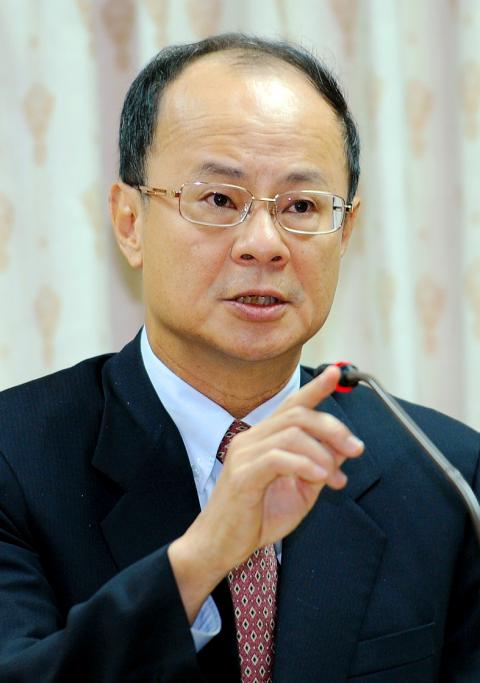Representative to Japan Shen Ssu-tsun (沈斯淳) yesterday provided scant details about the current status of relations between Taiwan and Japan to lawmakers, who were keen to know when the two countries could bring the relationship back on track following a territorial row.
The Japanese government on Sept. 11 bought three of the Diaoyutai Islands (釣魚台), known as the Senkaku Islands in Japan, from a private owner, leading to protests from the government and civil society against Japan, the recall of Shen from Tokyo, rallies and a trip to assert the country’s sovereignty and fishing rights involving fishing boats under coast guard protection.
Shen, recalled to Taiwan the day after Japan’s nationalization of the islands, was invited to attend a meeting on the issue at the legislature’s Foreign Affairs and National Defense Committee.

Photo: Liao Chen-huei, Taipei Times
Several Democratic Progressive Party (DPP) lawmakers pressed Shen on the government’s strategy toward Japan following the spat, asking when Taiwan would launch a new round of negotiations with Tokyo to ensure that fishermen can operate safely in the disputed waters.
Shen dismissed a report in yesterday’s Chinese-language China Times that claimed that Taiwan had recently rejected a proposal by Japan to resume the talks.
The newspaper said that the government had declined to engage in talks, which would be the 17th round of such talks if they were held, for three reasons: Japan had yet to acknowledge the controversy over sovereignty over the islands, the atmosphere was not fit to resume negotiations and the Fisheries Agency was not prepared for the talks.
“We did not reject the offer and communication on [resuming the talks] is ongoing,” Shen told DPP Legislator Tsai Huang-liang (蔡煌瑯).
Taipei and Tokyo were scheduled to open the 17th round of talks on fishing rights early this month, but Japan’s move forced the government to “re-evaluate the situation,” Shen said.
“The two sides have held 16 rounds of talks, but have failed to produce concrete results. We hoped this time we can create a framework to discuss the issue,” Shen said, without revealing on a possible date or agenda for the talks.
Tsai urged Shen to return to his post in Tokyo as soon as possible.
“You can’t expect the prime minster of Japan, Yoshihiko Noda, to recognize the sovereignty dispute in public. There is no chance of that,” Tsai said.
Tsai said the government should consider Tokyo’s willingness to resume talks on fishing rights with Taiwan as an “implicit acknowledgment,” so that the two sides can normalize their relations.
Chinese Nationalist Party (KMT) Legislator Lin Yu-fang (林郁方) said “there was no rush” for Shen to return to Japan.
Lin said the government should take the opportunity to press Tokyo more on the fishing rights issue while Japan is beset by internal and external problems.
“Japan is at its most vulnerable. If we don’t exert more pressure on Japan now, when can we?” Lin asked.

WAITING GAME: The US has so far only offered a ‘best rate tariff,’ which officials assume is about 15 percent, the same as Japan, a person familiar with the matter said Taiwan and the US have completed “technical consultations” regarding tariffs and a finalized rate is expected to be released soon, Executive Yuan spokeswoman Michelle Lee (李慧芝) told a news conference yesterday, as a 90-day pause on US President Donald Trump’s “reciprocal” tariffs is set to expire today. The two countries have reached a “certain degree of consensus” on issues such as tariffs, nontariff trade barriers, trade facilitation, supply chain resilience and economic security, Lee said. They also discussed opportunities for cooperation, investment and procurement, she said. A joint statement is still being negotiated and would be released once the US government has made

‘CRUDE’: The potential countermeasure is in response to South Africa renaming Taiwan’s representative offices and the insistence that it move out of Pretoria Taiwan is considering banning exports of semiconductors to South Africa after the latter unilaterally downgraded and changed the names of Taiwan’s two representative offices, the Ministry of Foreign Affairs (MOFA) said yesterday. On Monday last week, the South African Department of International Relations and Cooperation unilaterally released a statement saying that, as of April 1, the Taipei Liaison Offices in Pretoria and Cape Town had been renamed the “Taipei Commercial Office in Johannesburg” and the “Taipei Commercial Office in Cape Town.” Citing UN General Assembly Resolution 2758, it said that South Africa “recognizes the People’s Republic of China (PRC) as the sole

NEW GEAR: On top of the new Tien Kung IV air defense missiles, the military is expected to place orders for a new combat vehicle next year for delivery in 2028 Mass production of Tien Kung IV (Sky Bow IV) missiles is expected to start next year, with plans to order 122 pods, the Ministry of National Defense’s (MND) latest list of regulated military material showed. The document said that the armed forces would obtain 46 pods of the air defense missiles next year and 76 pods the year after that. The Tien Kung IV is designed to intercept cruise missiles and ballistic missiles to an altitude of 70km, compared with the 60km maximum altitude achieved by the Missile Segment Enhancement variant of PAC-3 systems. A defense source said yesterday that the number of

Taiwanese exports to the US are to be subject to a 20 percent tariff starting on Thursday next week, according to an executive order signed by US President Donald Trump yesterday. The 20 percent levy was the same as the tariffs imposed on Vietnam, Sri Lanka and Bangladesh by Trump. It was higher than the tariffs imposed on Japan, South Korea and the EU (15 percent), as well as those on the Philippines (19 percent). A Taiwan official with knowledge of the matter said it is a "phased" tariff rate, and negotiations would continue. "Once negotiations conclude, Taiwan will obtain a better